Navigating femtech: Simplifying patient intake forms for women’s health

Using digital solutions to bring equity to women’s healthcare
The gender healthcare cost gap is a stark reality, with women spending significantly more on medical expenses and getting less value than men (source). Traditionally, the healthcare industry’s male-centric framework in research, diagnostics, and treatment has led to overlooked symptoms, misdiagnoses, and inaccurate care for women.
Amidst these challenges, women’s healthcare companies have steadily and organically flourished in the digital health space. Collectively referred to as “femtech”, online women’s health services offer health tracking apps and customized treatments for women.
In this article, we’ll delve into some of the challenges within women’s healthcare and analyze how telehealth and efficient patient onboarding can enhance the overall experience for female patients.
What is femtech?
Femtech (female + technology) refers to a sector within digital health that develops products and services specifically for women. Originally starting with the period-tracking apps, this rapidly growing field has produced a wide range of digital tools, apps, wearables and other innovations that support women's health.
From reproductive health and menopause management to mental health and nutrition, technology is helping make healthcare for women accessible in a way that wasn’t possible before. Advancements include:
✅ Specialized care tailored for women’s health needs
✅ Virtual clinics are bringing affordable, personalized care right to patients’ homes.
✅ Femtech apps help women track important health metrics.
✅ New research is supporting women’s health journeys.
Let’s take a closer look at some of the ways femtech is improving women’s healthcare:
Specialized care tailored for women’s health needs
Femtech enhances healthcare for women through personalized and preventative measures. Women need customized and comprehensive care that considers their unique physiological, hormonal, and reproductive characteristics. A holistic approach to women's health emphasizes the interconnection between physical, mental, and emotional health, instead of just treating illnesses. Lifestyle choices and socio-cultural factors should also be considered. To assess all of these factors and develop effective treatment, femtech relies on comprehensive data collection and tracking tools.
Healthcare providers are using innovative solutions designed specifically for women to provide treatment for their distinctive and unique needs. Data-driven health services are listening to and recording their patients’ reports of pain and discomfort, which enables them to diagnose traditionally hard-to-detect women’s conditions like PCOS and conditions that present differently in women. When treated with empathy and accuracy, more women feel comfortable consulting doctors about their health, experience fewer frustrations, and receive better healthcare.
Improving care delivery with virtual clinics
If you’ve ever struggled to get a doctor’s appointment, you know that your medical care hinges on factors such as distance, availability, specialization, insurance, and bedside manners. Healthcare is vital, and yet issues with these factors that affect access have kept many women from getting the right care.
Technology has played a significant role in filling the gaps within traditional settings. Virtual clinics and telehealth services connect women to healthcare services that clinics and hospitals may not always be able to provide.
Online centers focusing on women's concerns like reproductive health, mental health, weight loss and eating disorders are improving patient outcomes. For example, a recent study found that two virtual doula appointments on a digital health platform correlated with a reduced likelihood of cesarean birth among all users (source). Ongoing care is valuable for all health issues and digital centers enable more patients to receive it.
Key advantages to online healthcare include:
- Accessibility: Virtual clinics and other femtech solutions increase access, overcoming geographical barriers. Women can schedule virtual visits conveniently within their workday and be seen without wait times. Patients in remote or underserved areas also have better access.
- Affordability: Digital centers contribute to more affordable healthcare, reducing the costs associated with traditional in-person visits, including travel expenses and loss of wages.
- Preference: The doctor-patient relationship is important in healthcare. Online services allow women to choose care providers based on gender, ethnicity, and treatment methods. This fosters trust and comfort, and increases the likelihood of continued engagement.
Enabling self-care with healthcare kits and apps
Healthcare technology is now reaching more women and empowering them to take control of their health with tools they can use on their own at home. Femtech solutions such as trackers and wearables, along with at-home diagnostics allow women to proactively monitor and manage their reproductive health-related data, for example. A new FDA-approved at-home insemination toolkit has proven to be as effective as clinic solutions. Not only do they offer the comfort and privacy of use at home, they’re usually much more affordable than standard procedures.
To be sure, these solutions should be used alongside in-person or virtual consultations with doctors. They’re not meant to replace the care of medical professionals but to support it. When used with the right supervision, femtech products can help bridge the gap for those who may face limitations in time, finances, or geographical proximity to clinics.

Reducing misdiagnosis and delayed treatment through research and awareness
A persistent issue in the healthcare system has been the lack of a women-centered approach to women’s health. This oversight has been fueled by underrepresentation in medical research and healthcare provider implicit biases that lead to overlooking or minimizing symptoms reported by women. The Gates Foundation reports that a mere 1% of medical research funding is allocated to conditions specific to women, excluding cancer. These inadequacies have consistently “led to misdiagnosis and delayed treatment" for women in everything from heart attacks to reproductive health (source).
Uncovering gendered symptoms
When women have heart attacks, their symptoms may be misconstrued as mere heartburn or indigestion. Strokes, depression, autoimmune diseases, osteoporosis, UTIs, Alzheimer’s disease, migraines and thyroid disorders are some of the other health issues that can present very differently between genders.
Shining a light on reproductive health
Inadequate research creates frustration in managing reproductive health, with conditions like endometriosis often dismissed as normal complaints. Women report battling for validation, struggling to prove the severity of their symptoms before receiving an accurate diagnosis. PCOS faces underdiagnosis due to diverse presentations and low awareness.
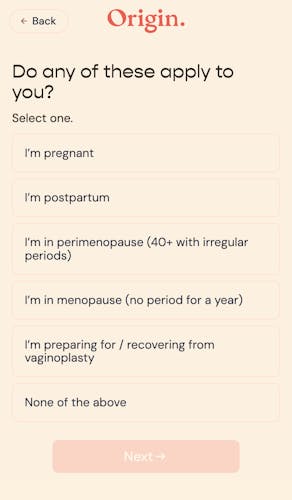
Femtech’s insights are turning the tide of research
Femtech solutions are significantly advancing research in women's health. Menstrual tracking apps, fertility monitors, and other digital health tools generate valuable insights into women's health patterns. This data aids researchers and healthcare professionals in understanding conditions, identifying trends, and developing personalized treatment approaches.
Digital onboarding and check-in forms
Online forms contribute to gathering valuable data about female patients, enhancing diagnostics and treatment plans. Let’s examine the impact of onboarding forms more closely.
The importance of efficient patient onboarding in women’s health
Femtech companies will need strategies and tools such as optimized onboarding forms to succeed in specialized care. Already thriving femtech companies use these forms to identify the right patients, deliver care, support self-care, and reduce costs over time.
Optimizing onboarding is critical for digital healthcare companies seeking to enhance care for women. Create a comprehensive, structured form to gather essential information, disqualify if necessary, and direct patients to the relevant branches. You’ll achieve:
✅ Better patient outcomes
✅ Streamlined business processes
✅ Cost-efficiency
A well-crafted onboarding process also lays the foundation for building trust and rapport. Start building a positive doctor-patient relationship right from the initial point of contact by asking relevant questions, setting the right tone, and protecting patient privacy in your onboarding form.
Using form builders for womancare patient intake
Many startups grapple with the build vs buy question when it comes to actually creating an onboarding form. You can read more about the pros and cons of each here but ultimately you save valuable engineering resources (and collective late-night hair pulling) by opting to go with a HIPAA compliant form builder.
Leverage advanced form builders to optimize patient onboarding. Formsort, for example, is a powerful tool that seamlessly integrates technology to enhance the femtech experience and redefine the way essential patient information is collected with these features:
Comprehensive data gathering
Structured sections for precision
Use Formsort to easily structure your onboarding forms into cohesive sections. Use the content library to streamline your build. Choose from a wide selection of question types and use the data validators to collect essential information. Enhance the form experiences with template formatting functions and pre-filling fields. Use interstitials to separate sections and provide information about your brand.
Branching for personalized patient journey
Not all women are the same so you want to ask questions that are relevant to each woman’s experience. Tailor questions to each woman's unique experience, considering significant factors like pregnancy, postpartum, or menopause that may influence health issues.
Use Formsort's conditional logic to create question pathways that responsively align with each patient’s health profile. Enhance personalization by addressing symptoms, disqualifying based on age or licensure, and redirecting to follow-up forms for additional diagnostics. Streamline the onboarding process to ensure patients easily navigate sections relevant to their health concerns.
Building trust and rapport
Set the right tone
Creating a positive connection with your female audience enhances the overall user experience and boosts conversions. Craft questions with sensitivity and relevance to create an environment where patients feel genuinely heard and understood. For inspiration on effective onboarding forms and tone-setting, our gallery Fineflows.
Ensure patient privacy
As a femtech company, you’ll most likely need to be HIPAA-compliant to ensure that sensitive patient data is safeguarded. Build your forms on a HIPAA-compliant platform like Formsort that prioritizes data security and patient privacy.
Add consent agreements and privacy policy notices in your form to establish transparency and trust. Depending on your industry, there are many levels of consent and different requirements for publishing your terms and conditions (TOC) and privacy policies. Consult with a lawyer to make sure you have the right consent documentation in place.
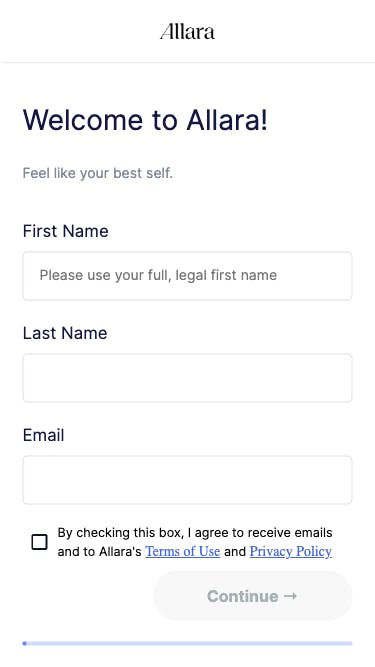
Enhanced conversion rates
Boost your conversion rates with a form that resonates with your target audience. Experiment with messaging and marketing campaigns. Making adjustments to page layout, animation, colors, questions’ order, and the length of the form can have significant effects on user engagement so it’s worth investing resources into a regular cycle of experimentation.
If you’re building on a platform like Formsort, you can test variants of your form, analyze drop-offs, and gather data from experiments to continuously improve your form.
Examples of Femtech companies using Formsort’s form builder
Formsort's women care clients are customizing their onboarding forms to ask targeted questions that align with the specific focus of their services. These tailored inquiries are designed to gather critical information related to various areas of women's health, ensuring a comprehensive understanding of individual needs, symptoms, and health histories.
Origin
A pelvic floor physical therapy center with 20 clinics nationally and a virtual support center, Origin uses a highly detailed onboarding form to understand the exact needs of prospective patients. Interstitials highlight gender-specific pelvic health data. Formsort features they’re using include dimension variables and exclusive select option.
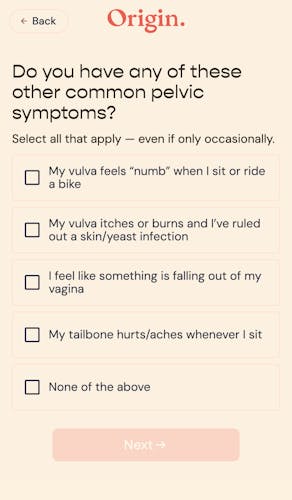
Femgevity
Femgevity is addressing the menopause knowledge gap as well as offering innovative support. Their concise onboarding form helps get patients connected to a provider quickly. With appointments available in the same week, they’re ensuring prompt access to healthcare. Read more about how to include scheduling solutions in your HIPAA-compliant form.
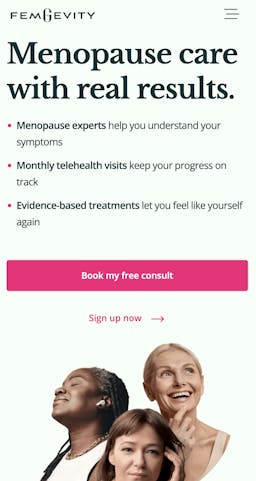
Allara
A center providing integrated therapies for an array of hormone-based conditions with overlapping symptoms, Allara expertly handles prospective patients in their onboarding form. They reassure and inform patients as they gather information about symptoms and health history. They’re using conditional logic to ensure patients are seeing only the most relevant questions and interstitials to educate and connect with patients.
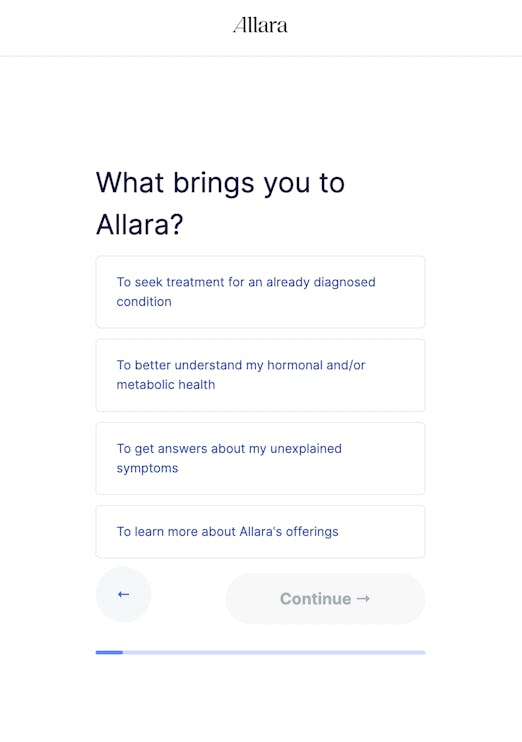
Evernow
Evernow is an online menopausal hormone therapy (MHT) center that offers a customized treatment package and supervision under their medical team. Their detailed onboarding form gathers the information about symptoms and health history and uses Formsort’s calculated variables to determine the most appropriate product recommendation.
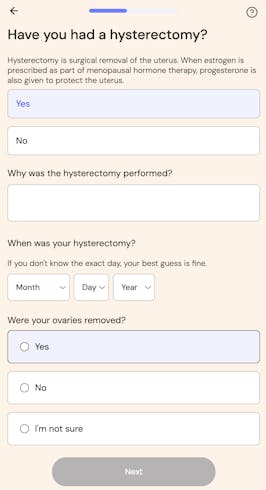
Build your femtech forms with Formsort
Optimizing patient onboarding is not just a procedural necessity. It’s a strategic pillar shaping the future of women's healthcare. In digital healthcare, streamlined onboarding processes are catalysts for delivering personalized, accessible, and financially sustainable healthcare experiences for women.
Formsort, a HIPAA-compliant form builder, understands the need for better healthcare for women. We provide form solutions that let you easily build onboarding forms so you can focus on providing care. Start building your onboarding form on Formsort today!